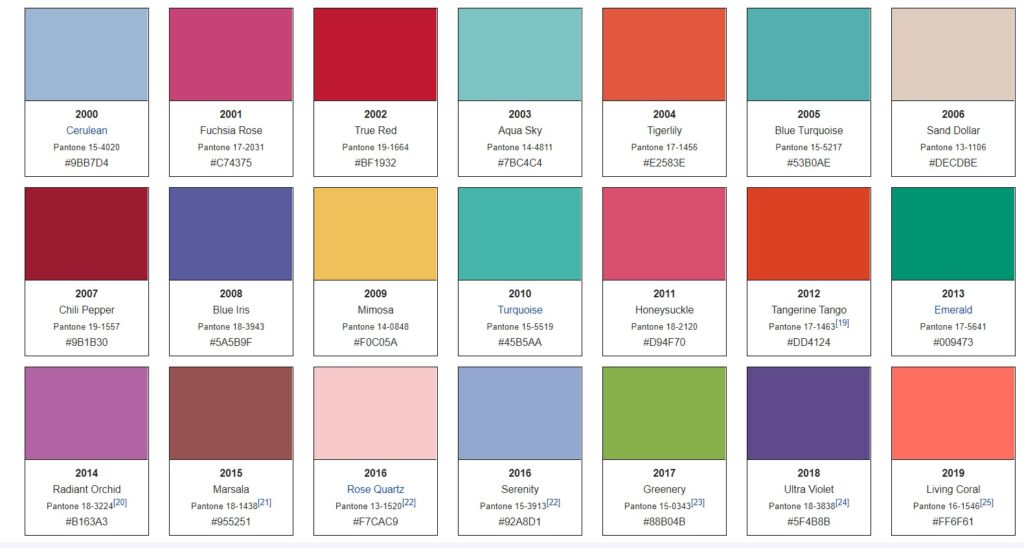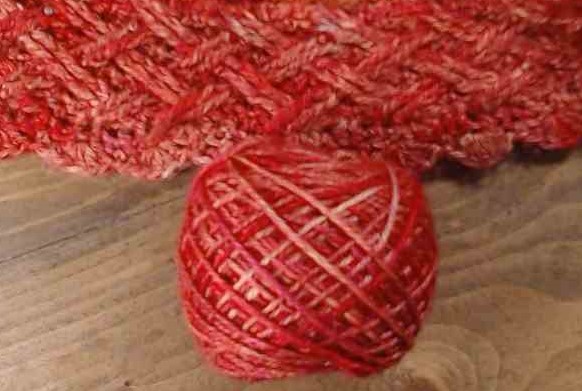Diabetes and Me, part 3
So I have shared my story about how I was diagnosed with Type 2 (T2) Diabetes, and how Diabetes works in the body. This post is about relearning what I knew about nutrition, and how we used to treat Diabetes.
Historically, if you were diagnosed with “sugar disease” you would be instructed to follow a low carb, high fat/high protein diet. The next few images come from a book dated 1917. Artifical insulin wasn’t discovered until 1922, so this is what people did before they could medicate.
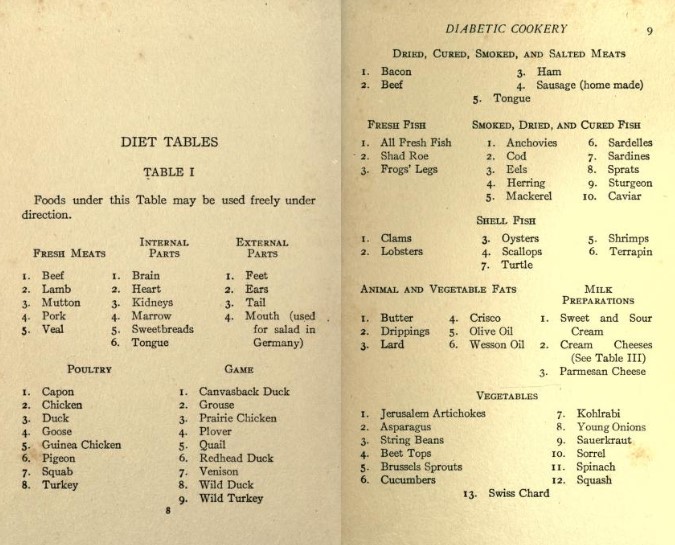
Table 1 shows acceptable proteins in the Diabetic Cookery Diet, some fats, and starts to list vegetables. Some are a little, um, gross? REALLY? They eat MOUTH in Germany? But, mostly it’s foods that most people know to be low carb.
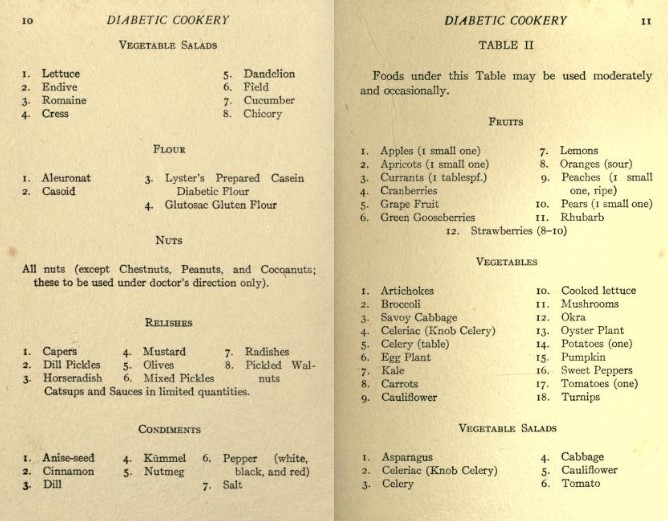
The page on the left is a continuation of Table 1, more vegetables, nuts, flours, condiments. The page on the right are the foods you would eat less of, but are still acceptable in controlled amounts.
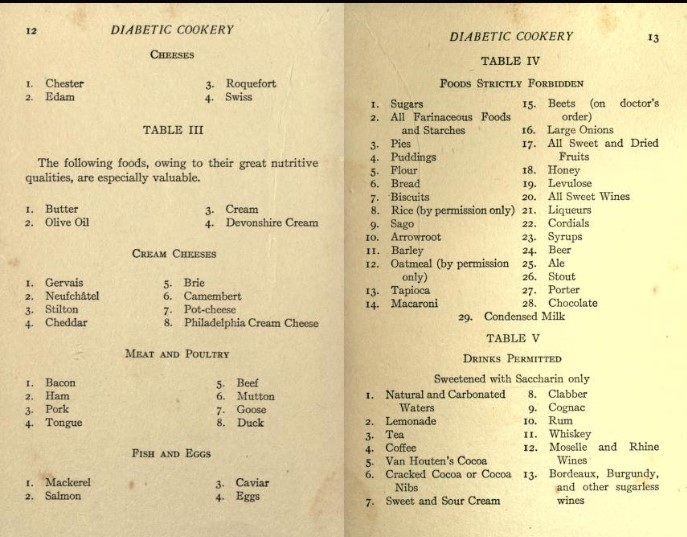
And my favorite table: Table 3 shows highly nutritious foods that will fill you and keep your energy up. Table 4 shows foods you should avoid at all costs. These foods will raise your blood sugar unsafely, so just don’t eat them. And then a list of beverages.
Notice anything? If you’re at all familiar with the Keto Diet, these items should be pretty familiar to you. There are a few exceptions but mostly the allowable foods align with Keto, and the avoid at all costs foods do as well.
Why did we ever stop doing this????
If you are over 40 and overweight, Type 2 Diabetes is a real risk for you. Get a physical every year, and if your fasting blood sugar is over 100, that’s the first sign that something is starting to go wrong. If you catch it early, you can prevent further damage and major stress. I ignored my doctors when my fasting levels were starting to creep up because my A1C was still “acceptable”. And I had a horrible experience with hospitalization as a result.
Once I got home from the hospital, I started reading everything I could. I had heard of keto, and having dealt with gestational diabetes during both of my pregnancies, I was familiar with carb counting. But, Keto limits you to a total of 20 carbs a day. The American Diabetes Association diet recommends 1-2 carb servings of approximately 15 carbs each 4-6 times a day. And suddenly I was going to limit myself to one carb serving for an entire day???? Seemed impossible.
The first night, I was overwhelmed. I hadn’t eaten anything other than one hard boiled egg in 3 days. Food was intensely frightening to me. I was checking my blood sugar constantly and despite having no food in my system, my blood sugar was still in the high 200s. How could this be happening?
Fortunately, my kids are both foodies and my sweet daughter came to my rescue with a beautiful salad prepared with low carb items – grilled chicken, sunflower seeds, cheese, and I don’t even remember what else, but it had olive oil and vinegar drizzled over top. It was presented beautifully and with so much love.
I ate it tentatively, but it was delicious. I was terrified that my body was going to betray me further and my blood sugar was going to sky rocket. But, that didn’t happen. This was the beginning of learning to trust my body again, recognize what I really needed, and resume loving food.
It was extremely scary those first few weeks relearning everything I thought I knew about food. My mantra in the beginning was “more butter please!” and I put butter on everything!
The strangest part of going keto was recognizing that fat was totally okay. I was always the person who picked the skin off the turkey and snuck a bite when nobody was looking. Or put gobs of butter on my bread, because bread was just a vehicle to get butter in my mouth. That fat I always trimmed off my steak was really just for show. If I thought nobody was looking, I’d totally eat it! I was so full of shame for loving fat and avoiding lean. But suddenly, that was my goal! All the fat! None of the lean! And it was okay?!?!?! Yes. It is okay!
I have always heard that high cholesterol is caused by eating too much fat. I started to learn that is simply not true. With all the things that were wrong with me, my cholesterol was perfectly fine. So, this was not something I needed to worry about. I decided to dive in to keto, monitor my health markers, and see how things went.
My starting point: – March 17, 2018
| Test | Result |
| A1C | 11.3 |
| Average daily glucose | 278 |
| Cholesterol | 166 |
| Triglycerides | 92 |
| LDL | 92 |
| Cholesterol/HDL Ratio | 3.0 |
| HDL | 56 |
Next up we’ll look at what I started eating! I know it will surprise people who aren’t familiar with keto.







